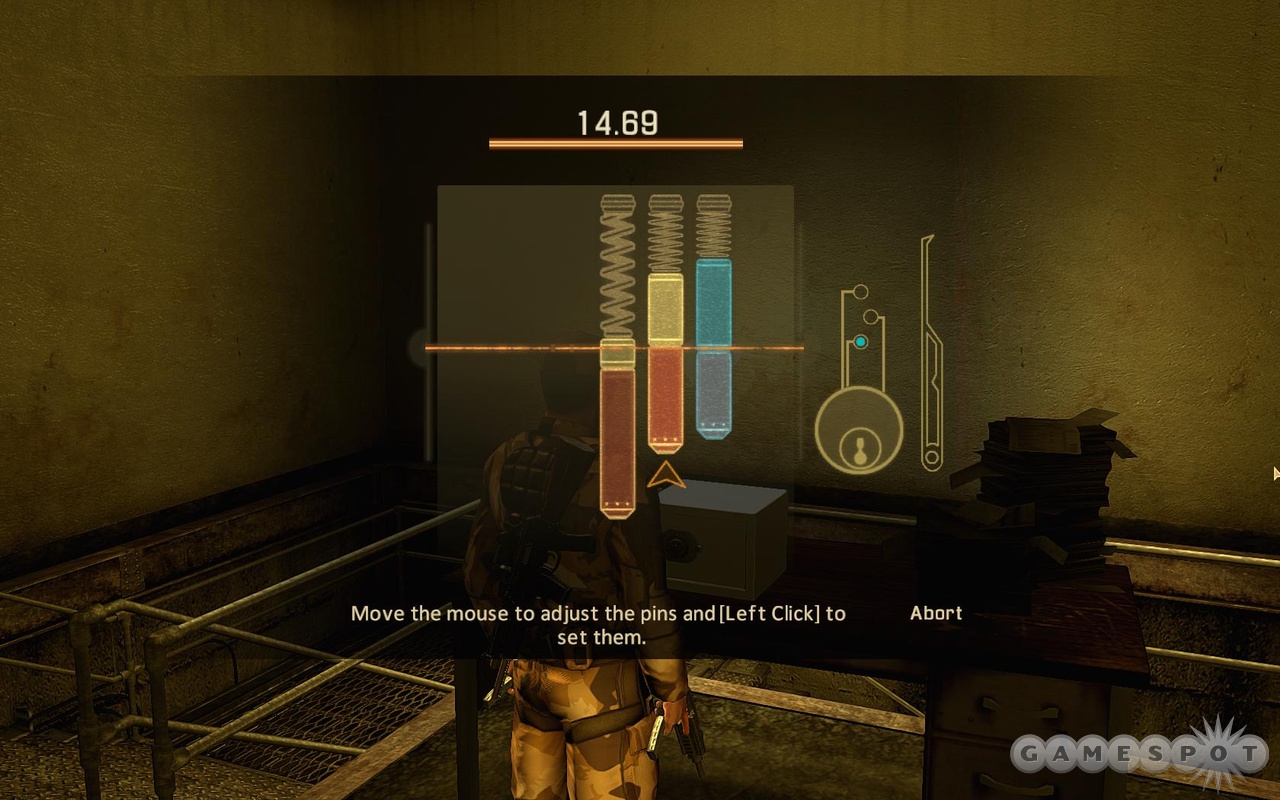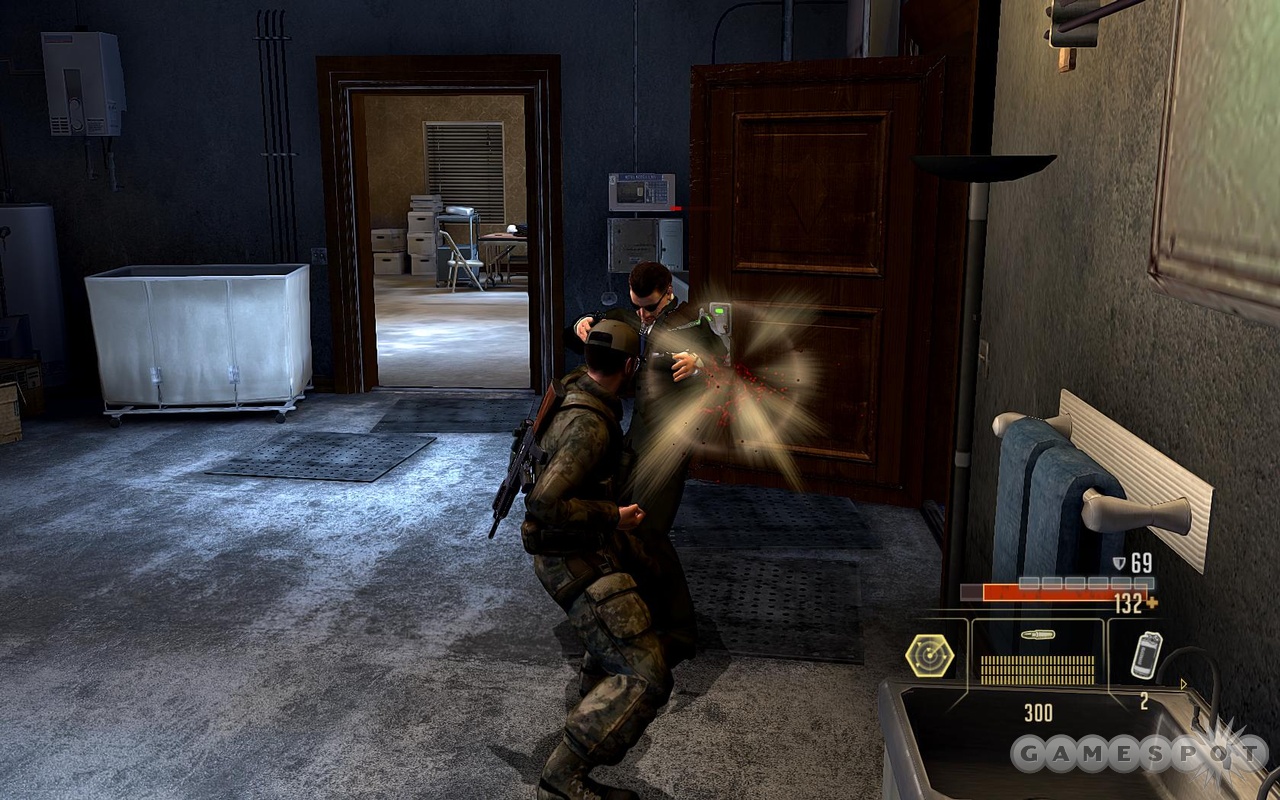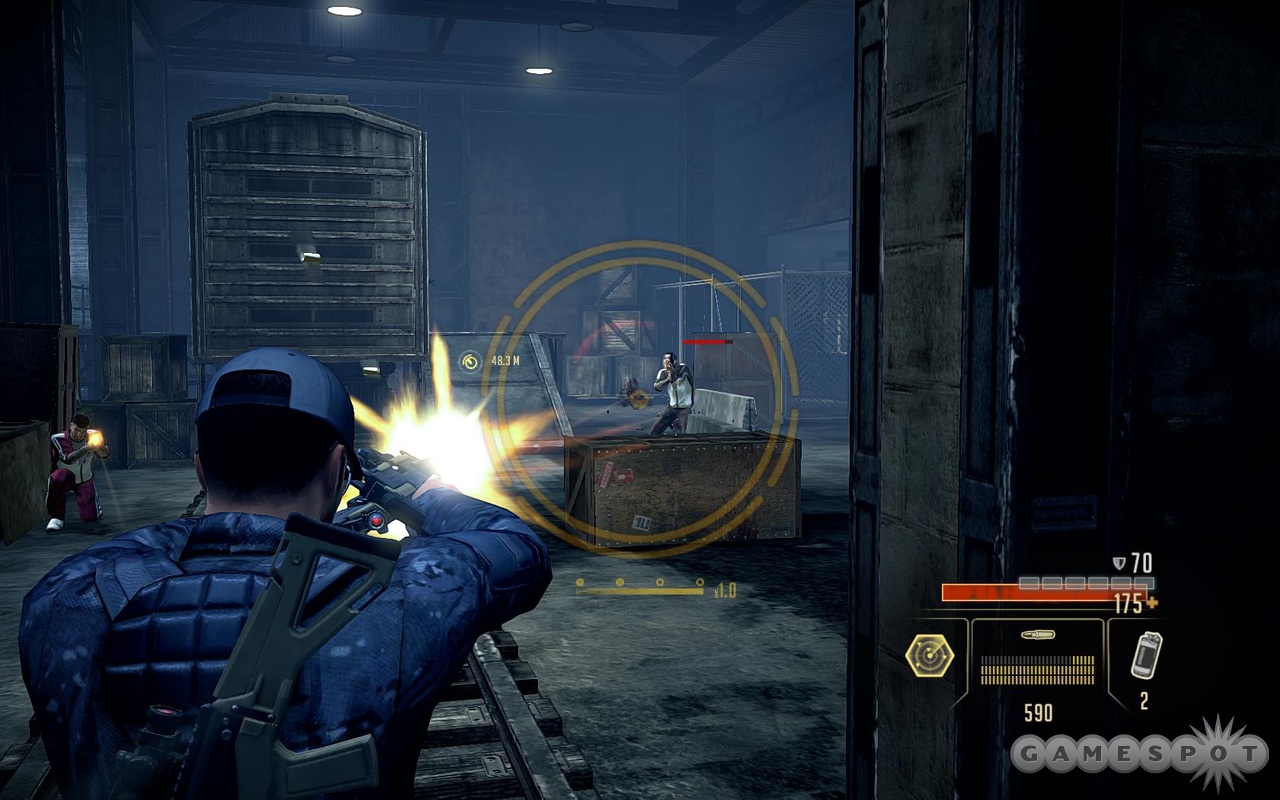Playing Alpha Protocol is like putting together a 5,000-piece jigsaw puzzle with 500 pieces missing: You get a sense of what the big picture should have been, but the final product is still maddeningly incomplete. This intriguing role-playing game boasts an extraordinarily flexible plot, in which your choices have real consequences both on the story and on the gameplay. Sadly, almost every other element has been skimped upon, resulting in an awkward amalgam of half-baked gameplay elements that never come together. On paper, Alpha Protocol sounds thrilling: You can go into each mission guns blazing, sneak up on your enemies to take them down before they see you coming, or mix and match methods as you see fit all while hacking computers and picking locks to uncover the enemies' deepest secrets. In practice, none of these mechanics work out very well. Terrible AI, a too-close camera angle, and other annoying inconsistencies make the stealth route feel random and unsatisfying. These issues, along with the unreliable cover system and a number of bugs and weapon imbalances, make shooting feel equally clumsy. It's easy to appreciate Alpha Protocol for its high ambitions; it's just not that much fun to play it.
The game begins with a bang--or more specifically, a horrific explosion. Taking a cue from our modern political climate, the opening scenes depict a missile colliding with a commercial airliner. Shortly thereafter, you meet the game's protagonist, Michael Thorton, who is being inducted into a top-secret United States government agency known as Alpha Protocol. Your first mission: travel to Saudi Arabia and investigate the terrorist group responsible for the bombing. Of course, nothing is ever as it seems, and Mike's first mission ends like it began--with the explosion of a well-aimed missile. Thus, a globe-hopping journey through Russia, Italy, and Taiwan ensues as Mike sifts through the information he gathers and follows the necessary leads. The story plays out more or less like a season of 24, though in this case, you get to decide how you to proceed toward the final hour.
Alpha Protocol's greatest asset is, by far, the complex workings behind its plot progression. Conversations with other characters bring with them broad dialogue choices. Most of them boil down to one of three attitudes: aggressive, professional, or suave. Different characters react to you in different ways depending on what approach they most appreciate. A sweet-natured fellow agent may enjoy your flirtations, for example, while a tough-talking Russian vixen may not be so enamored. These characters may stay neutral toward you or they may take a liking (or disliking) to you. If the individual is your handler--that is, your mission guide--you may receive a bonus perk, such as a boost to your endurance levels. In other cases, an allied faction may fight alongside you in battle or provide access to weapons you wouldn't otherwise encounter. In extreme cases, there are life-or-death consequences in which you must weigh the risks of allowing a nemesis to live against the potential benefit he or she might offer: guns, information, and so forth. Many of the plot essentials are more or less static, but how you discover them and the people that join you on the journey can differ from one play-through to the next. Few games can truly make you feel as if you are having an impact on the story, but this is the one area in which Alpha Protocol delivers--and extraordinarily so.
Unfortunately, the storytelling gets bogged down by its own ambitions. What with all its complicated machinations, the game doesn't have much heart, which in turn makes it difficult to feel invested in its branching plot developments. At one point, you may receive an in-game e-mail from a female character that references the sexual tension you've apparently developed, but the story never adequately demonstrates that tension; the e-mail comes as a complete surprise. You may even get the opportunity for a few sexual dalliances toward the end of the game, but because the story never builds on these relationships, these scenes seem forced and mechanical. By the time you reach the final mission, you get the sense that developer Obsidian Entertainment had no idea how to wrap the story up. One potentially emotional moment is treated so flippantly that it's almost insulting; another major revelation foreshadows a confrontation that never comes, making the development feel more cheap than shocking. You sense that the voice actors have done their best to lend some humanity to the story, but Alpha Protocol is all business and no fun; all plot and no character. There are light moments, such as some hysterical news reports on the television (a story about children and sugar is a fun highlight), and Mike's cocky half-grin is occasionally disarming. But these are small delights in a robotic narrative that may stimulate your intellect but not your emotions.

Like the story, the character progression offers a good number of options for letting you advance as you see fit. You decide what abilities to focus on, what weapons to take into battle, and what gadgets to equip. You choose a specialization for Mike early on, which is tantamount to choosing a class or profession in other RPGs. This discipline then determines the depth of your skill trees, from pistols and submachine guns to stealth and endurance. As you'd expect, each time you level up, you then spend points in these various disciplines, which in turn makes the associated actions more effective and unlocks new abilities. For example, leveling up your shotgun tree opens up the room sweep ability, which adds a critical knockdown to every shot; upgrading the martial arts tree adds the fury skill that enhances your hand-to-hand effectiveness. Armor and weapon modifications, as well as a healthy array of different weapons, ammo types, and gadgets, allow for further customization. The resulting flexibility is incredibly impressive.
Unfortunately, the basic gameplay mechanics prevent the wealth of options from getting the justice they deserve. It's clear from the moment that you move around in Alpha Protocol that something isn't quite right. You control Mike from a third-person perspective, but the camera is often zoomed rather close to him, which is a hindrance to taking in your surroundings or navigating close spaces. If you stoop, the camera pulls away somewhat and you get a better view, though the way Mike scuttles about while crouching is laughably awkward. As you progress, you find the camera can cause mild headaches in other ways as well. For some unknown reason, descending a ladder or jumping from a ledge (always a contextual action, never a freely controllable one) causes the camera to swoop to an overhead view and remain there, which is unhelpful and disorienting. At other times, you might pop up from behind cover to take a shot, only to have the camera shift into a useless position or even have your own body get in the way. These gaffes seem odd, considering most game developers seem to have worked through such basic obstacles years ago. You get accustomed to them, but these problems make the simple act of moving from place to place feel uncomfortable.
The camera isn't the only issue with the cover system, which is generally workable but also inconsistent and occasionally buggy. At a basic level, cover works as it does in a third-person shooter like Gears of War: You press a button to take cover behind a barricade or wall and peek over or around to shoot at enemies. But like much of Alpha Protocol, cover isn't implemented well. Sometimes you encounter walls that you can't take cover behind for no discernible reason; at other times, the stickiness of the cover mechanic combined with the close camera can make it awkward to get out of the way of an incoming grenade. You might also run into glitches and bugs where cover is concerned. Some of these are bizarre but not likely to bother you too much, such as weird animation glitches or moments when you might slide a few feet to the side like the ground is coated with ice. Other bugs are more annoying. You might pop up from behind cover only to discover that your targeting reticle is missing and you can't shoot your weapon--a problem that can only be fixed by extricating yourself from cover. Or for some reason you won't be able to toss a grenade from behind a barricade. Again, basic mechanics gone bitter distract from the complexities that make Alpha Protocol special.

The shooting isn't great in Alpha Protocol, but you may have some fun with it, assuming you choose the game's most effective loadout. If you want to take the shoot-first, talk-later approach, you should almost certainly take an assault rifle with you. They are the game's most powerful weapons, and when used with the auto-targeting ability you unlock early on, they can make you almost unstoppable. Alpha Protocol is not a straight-up shooter, however. Under-the-hood calculations figure into your abilities in the field, so just because you aim directly at a bad guy's head and pull the trigger doesn't mean you're going to lodge a bullet in his skull. If you expect your shooting prowess to translate to battlefield superiority, you'll find that it's only part of the equation. It's too bad it isn't a bigger part of the equation where pistols are concerned. Pistols feel relatively weak, which is to be expected, though they would seem an attractive last-resort option if you pursue the stealth angle. But you are often put in situations that can only be solved with firearms and are clearly designed with long-range weaponry in mind. In these situations, a pistol/shotgun combo is often ineffective. If you focused on stealth and melee at the expense of ranged weapons, expect some frustrations in certain combat scenarios and boss encounters.
The combat challenges come primarily from such imbalances, not from the opposition's desire to stay alive. The AI is pretty dreadful. Security agents and mercenaries run about the levels in haphazard ways, may start climbing ladders as you fill them with lead, will kneel on top of exploding barrels, or might stare directly at you but fail to react unless you take a shot or give them a good punch. There's a weird sense of randomness to your enemies' behavior that diminishes the impact firefights may have had. Other flaws also conspire against the shooting--flaws so simple it's surprising they made it into the final product. For example, when you activate a power, the screen takes on a bright yellow tone, as if someone turned up the light bloom setting extraordinarily high. Unfortunately, your targeting reticle is a dull yellow and can become practically invisible when the effect occurs. The effect can even obscure your target. This is a big inconvenience when using the chain shot ability, which can also cause your screen to jitter uncontrollably. There are chances to get behind turrets and take aim, but the loosey-goosey controls keep these moments from being much fun--a drawback that also applies to a few sniping sections. We also ran into some bugs here as well. On several occasions, manning a turret caused the screen to become painfully blurry and moving the camera resulted in egregious screen tearing.

Not every section requires you to shoot, however. The stealth skill tree harbors some of the more helpful abilities, such as master awareness, which pinpoints nearby enemies automatically. The higher up the tree you go, the more viable stealth becomes. Yet Alpha Protocol is no more a proper stealth game than it is a shooter. As with the shooting, the inconsistent AI provides a major hindrance, and the typically close camera can get in the way of locating nearby enemies. Instead of offering typical stealth game tropes--a minimap with vision cones or the ability to hide in the shadows, for example--the game gives you superhuman moves, such as temporary invisibility. Sneaking up on an enemy and taking him down with a minimum of fuss is mildly rewarding, as it tends to be in most games. But the actions you take leading up to that point involve activating certain skills and scurrying around in your silly crouched position--not outsmarting sharp AI or using the environment in clever ways.
An espionage RPG wouldn't be complete without a bit of hacking and alarm disabling, and to that end, Alpha Protocol features three corresponding minigames. One of them is not so bad: You identify a sequence of mazelike lines in the correct order. It feels just right--not too easy, and not too challenging. It's just enough to keep you on your toes, but another minigame isn't quite as successful. Here, you must identify two lines of stationary code in the midst of a busy grid of moving characters. It can be a challenge to identify the code, which is great. But the still bits you need to identify will be repositioned after a few moments, and the cursor you must position over the matching code moves too slowly. It can be exasperating to isolate the code, only for it to be relocated while you're trying to move the overly sluggish cursor to the right spot. Lock-picking can be equally tense, at least in the console versions, but it's a much more sensible mechanic. Here, you need to position the depicted rods by finessing the left trigger into a specific spot. This takes some getting used to, but it's challenging in just the right way. Sadly, that's not the case in the PC version: You just move the rod into position with the mouse and click. It's super easy.

Alpha Protocol utilizes the Unreal 3 graphics engine, though the only sign that this modern technology was used occurs with the engine's telltale texture pop-in. The pop-in is barely noticeable on the PC, but it's quite an eyesore in the console versions of the game. Sometimes, it takes up to 10 seconds or more for higher-resolution textures to appear, and at rare but noticeable times, they may never appear at all. The pop-in is a distraction, though it may have been more forgivable had the game compensated for it with great visuals. But Alpha Protocol is not a looker on any platform. Environments are plain and textures lack detail, and you won't encounter the quality lighting and shadows you might expect to see in modern games. Animations are stiff and occasionally buggy and often appear to be missing multiple frames, which contributes to the game's overall inelegance. Alpha Protocol is not ugly, however; it's just behind the times and artistically uninspired. Nevertheless, the safe houses Mike operates from between missions have some nice views, and some of the outdoor missions throw in some welcome flashes of color. Similarly, the sound design gets the job done, though without much style. The voice acting is at least solid, and the generic action-movie soundtrack ramps up at the right moments but otherwise stays out of the way.
Alpha Protocol's ambitions are commendable, and if you're a role-playing fanatic, you'll enjoy investigating its intricacies. It's unfortunate that its various ingredients are so undercooked. The flaky cover system, the mediocre production values, the fundamental blemishes gone unchecked--these elements add up quickly and drag the experience down. The elaborate storytelling and character progression are impressive. It's too bad that the gawky, glitchy gameplay can't rise to the same standard.